POLS 1140
Origins of political predispositions
Updated Mar 9, 2025
Monday
Plan
Monday:
Announcements
- Group Projects and Revised (Again) Timeline
Egan (2012)
Introduction to Political Socialization
Wednesday:
- Family (Stoker, Jennings and Bowers 2009), Schools, and the State as agents of socialization
Friday:
- Biology in Politics (Alford, Funk and Hibbing, 2005)
Group Projects
Draft Survey Instrument by Wednesday, Discuss/Revisons by Friday
Survey in the field this weekend
Next Week
Monday: Workshop Planned Comparisons
Wednesday: Workshop Results
Friday: Workshop Presentations
Last Week
Monday: December 2: Finalize Presentations
Wednesday: December 4: Presentations Part 1
Friday: December 4: Presentations Part 2
Or we could do presentations during Reading period…
Final Papers
Final Paper Structure
- Introduce the topic:
- Lay out key theories and topics
- Present a major debate that interests you
- Discuss revisions or extensions to that debate
- Offer a direction for future research
Final Paper Structure
- What is partisanship?
- Why does partisanship matter?
- Partisanship is a social identity
- Partisanship is a heuristic for voters
- Partisanship bleeds into our personal lives
Wednesday
Plan
Today:
- Political socialization
- Family
- Schools
- Political Institutions
Friday:
- Results of Last week’s survey
- Biology and Politics
- Finally get you draft of the survey (sorry, tenure stuff…)
Talk on Friday:
Friday
Plan
Finish up discussion of socialization
Schools
Institutions
Biology and Politics
- Twin Studies
- Gene Studies
- Physiological studies
- Personality
Talk survey next week. No readings
Talk Today:
Egan (2012)
Review
Take a few minutes to review your notes on Egan (2012)
- What is the research question?
- What is the theoretical framework
- What is the expectation and design
- What are the results?
Research Question
What explains the political cohesion of lesbian, gay, and bisexual citizens?
Is it a function of identity mobilization
Or a reflection of selection effects (common attributes that predict shared identity)
Theoretical framework
- Distinguishes between sexual preferences and sexual identity
While the preponderance of the evidence is that the degree to which one is sexually attracted to those of the same sex is a trait that is fixed at birth or in early childhood, being gay is a chosen identity – an identity acquired among a non-random subset of those endowed with the trait of same-sex attraction.
Past work on identities suggest chosen identities → + cohesion
Mobilization
Acculturation
Egan proposes an alternative mechanism: selection
Selection and group cohesion
“[T]he process by which stable characteristics that are truly ‘unmoved movers’ – the indelible aspects of one’s background and upbringing – help to determine whether a person self-selects into membership of a politically relevant group” (p. 598)
Why Selection Matters: Substantively
“To the extent that group members are loyal partisans for reasons that antecede the acquisition of group identity – and therefore are less easily moved by appeals to group interests – it becomes more difficult for group leaders to make a credible threat to withhold support from their allies in order to win policy concession” (p. 598)
Why Selection Matters Empirically
Failing to control for “pre-treatment” variables (things that predict identity acquisition) biases our estimates of the effects of that identity
Controlling for factors “post-treatment” likewise obscures the effect of identity, since these factors may be influenced by identity acquisition
Expectations:
“If selection is at work in making a group’s members politically distinctive, the ceteris paribus differences in political views between group members and the general population should be reduced after conditioning on the effects of background characteristics that shape identity choice and are also known to be determinants of political views.”
- Accounting for selection should reduce differences
Expectations:
In addition, if selection effects are present, it should be the case that group members are distinct from non-group members from the moment they identify with the group and thus the development of political cohesion should not require the mobilization processes that can accompany the passage of time, contact with group members or receipt of co-ordinating messages from group leaders
- Differences should exist in the absence of mobilization acculturation
Design
Data: GSS and exit poll surveys
Method: Matching
Matching
Matching is a statistical procedure to adjust for differences between groups in observational data
When we match we’re trying to recreate what is accomplished by random assignment in an experiment
While random assignment guarantees this for all variables (observed and unobserved), matching provides balance only on observed covariates.
Little Variation in Support based on Candidates LGB Voting Records

Sexuality vs LGB Identification

Initial evidence of selection

Further evidence of selection

Matching creates balance on observed covariates

Quantifying selection effects

Selection explains group cohesion of LGB on policy and ideology

Differences exist before mobilization and acculturation

Summary
Egan argues selection accounts for group cohesion among LGB individuals
Matching as a tool for making causal claims with observational data
- Useful tool but not a magic wand
Possible critiques and/or extensions?
Political Socialization
Overview
- What is political socialization?
- What are the agents of political socialization?
- Nature vs nurture?
What is political socialization?
- Broadly research on political socialization seeks to explain “what, how, and when political attitudes and behavior are learned” (Hepburn 1995)
What is political socialization?
Two views of political socialization:
- Micro: Socialization is about the process of learning
- Macro: Socialization is about the making of citizens
Hyman (1959)
- Hyman defines political socialization is a person’s “learning of social patterns corresponding to his societal position as mediated through various agencies of society”
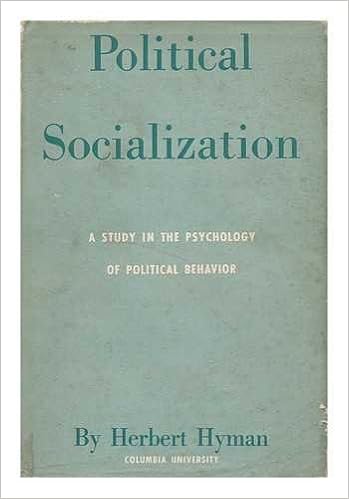
Easton and the making of citizens
Easton takes a more macro view of political socialization in a broader effort to understand the persistence and stability of political systems
Goal is to generate diffuse support/legitimacy for the system
Conservative/Status quo bias

Political Socialization and Political Learning

Source: Conover (1991)
The rise (and fall) of political socialization

What explains this
Empirical Challenges
Hard to get data
Mixed results
Theoretical Challenges
- Lack of conceptual clarity
What are the agents of political socialization?
Take a few moments to write down some possible agents of socialization
In groups discuss:
- Mechanisms (Why these agents have an effect)
- Designs (How would you know?)
What are the agents of political socialization?
Family
Schools
Peers
Media
Religion
Parties
Institutions (“The state”)
What are the agents of political socialization?
Family
Schools
Peers
Media
Religion
Parties
Institutions (“The state”)
Family as an agent of socialization
Family as an agent of socialization

Research questions
What evidence is there of inter-generational transmission?
What makes transmission more or less likely?
Are we sure it’s families doing the transmission?
What are the long term consequences?
What evidence is there of inter generational transmission?
How well does a parent’s score predict a child’s score?
What evidence is there of inter generational transmission?
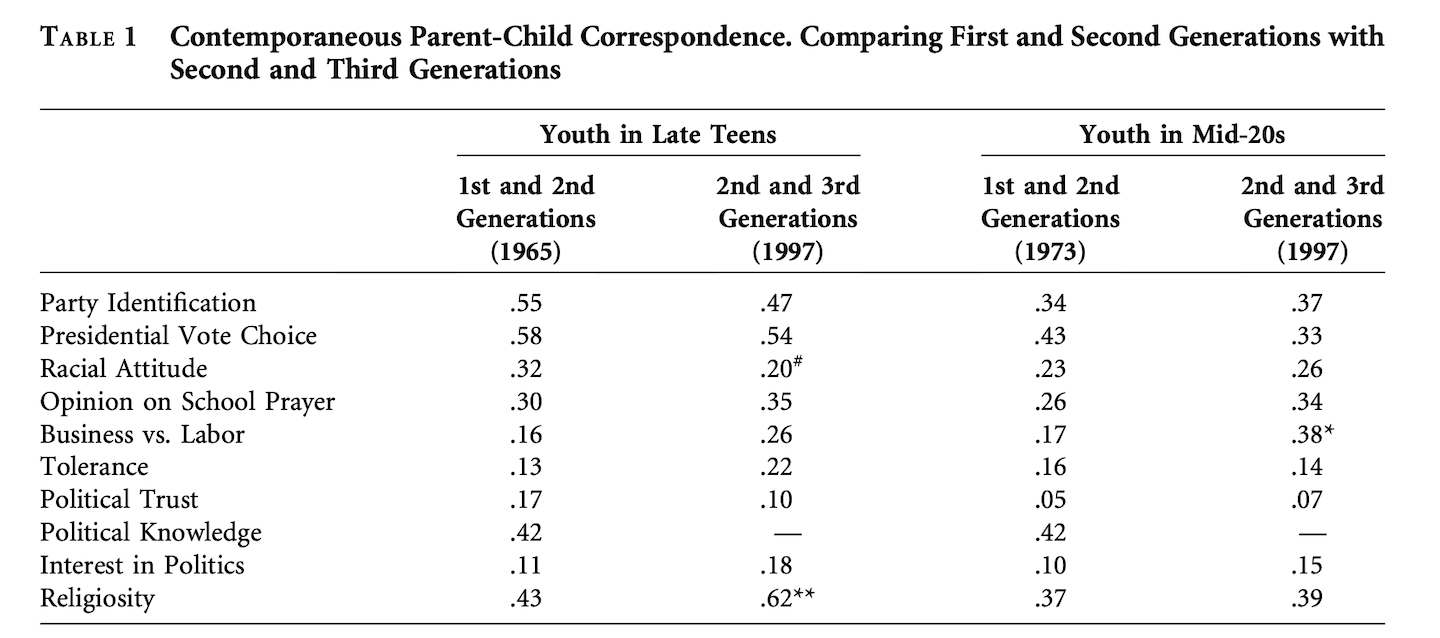
What makes transmission more or less likely
Social learning theory suggests transmission rates should be higher when:
- Families are more politicized
- Context is more consistent
What makes transmission more or less likely

What makes transmission more or less likely
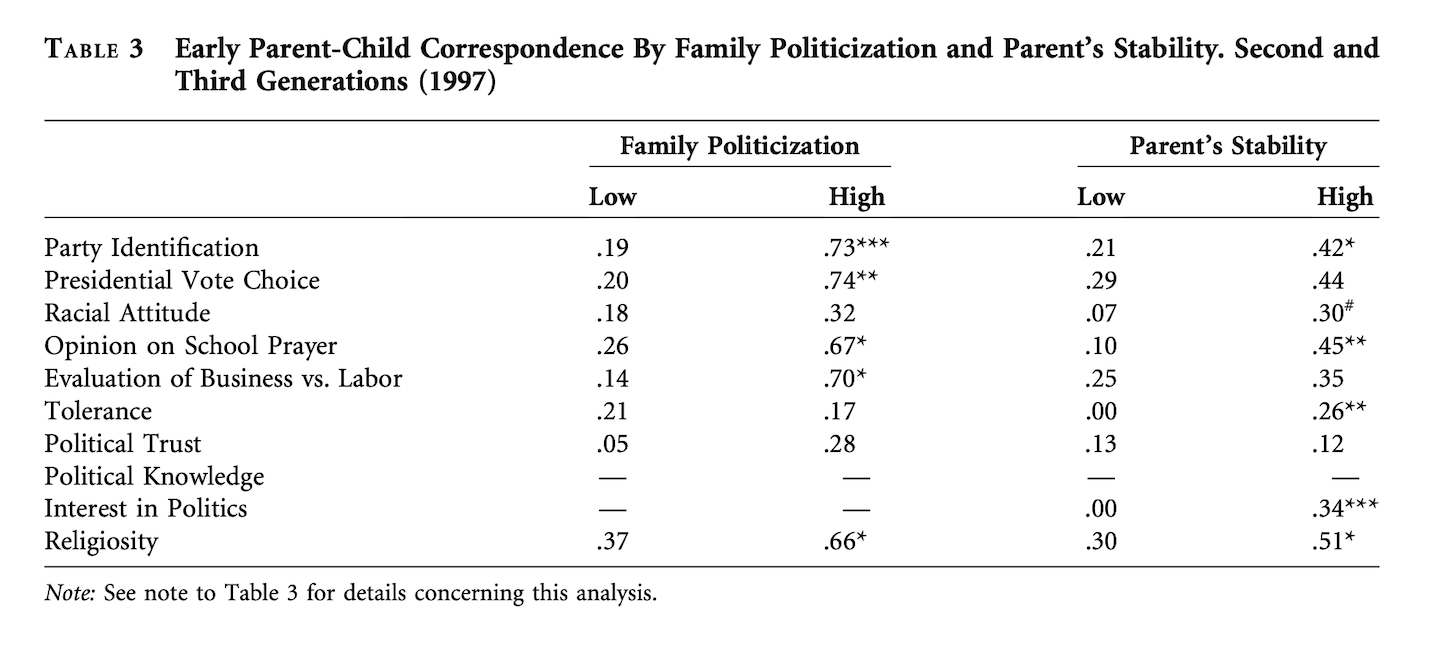
Are we sure it’s families doing the transmission
What happens if we control for alternative explanations
Are we sure it’s families doing the transmission
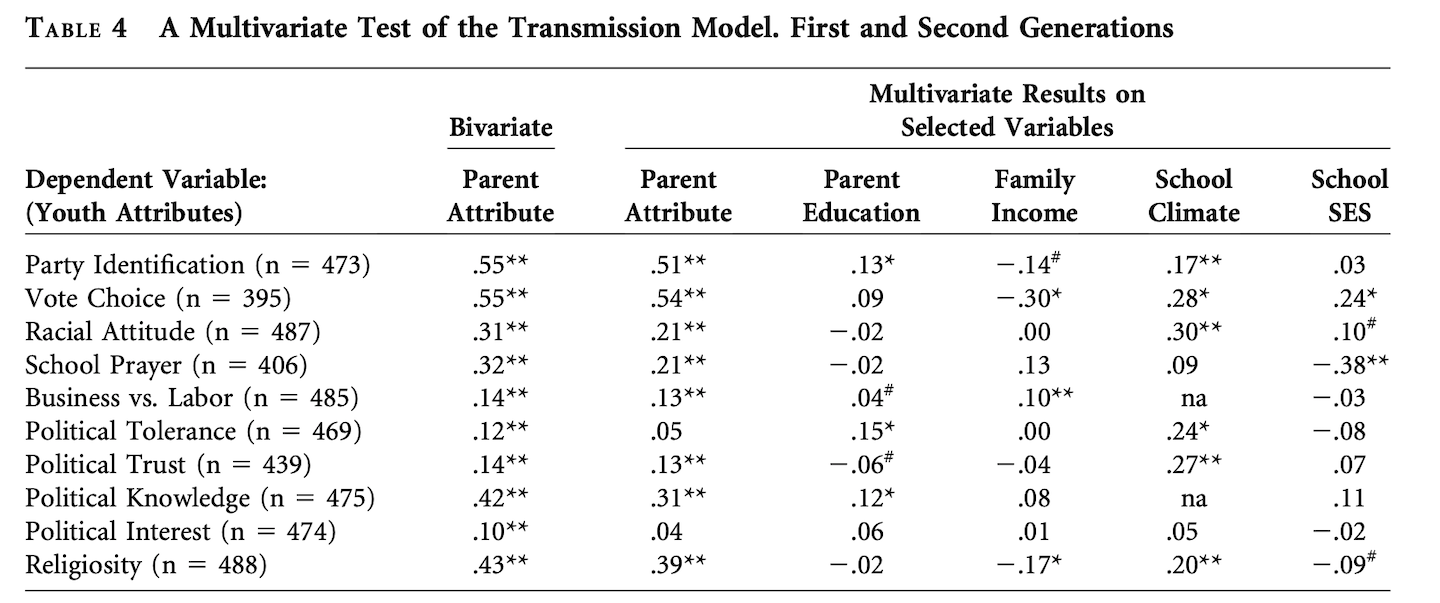
What are the long term consequences
If children are at least partly the product of their parents’ role as political socializers, then the degree of continuity among the socializees should represent the residue of parental influence over time.
What are the long term consequences
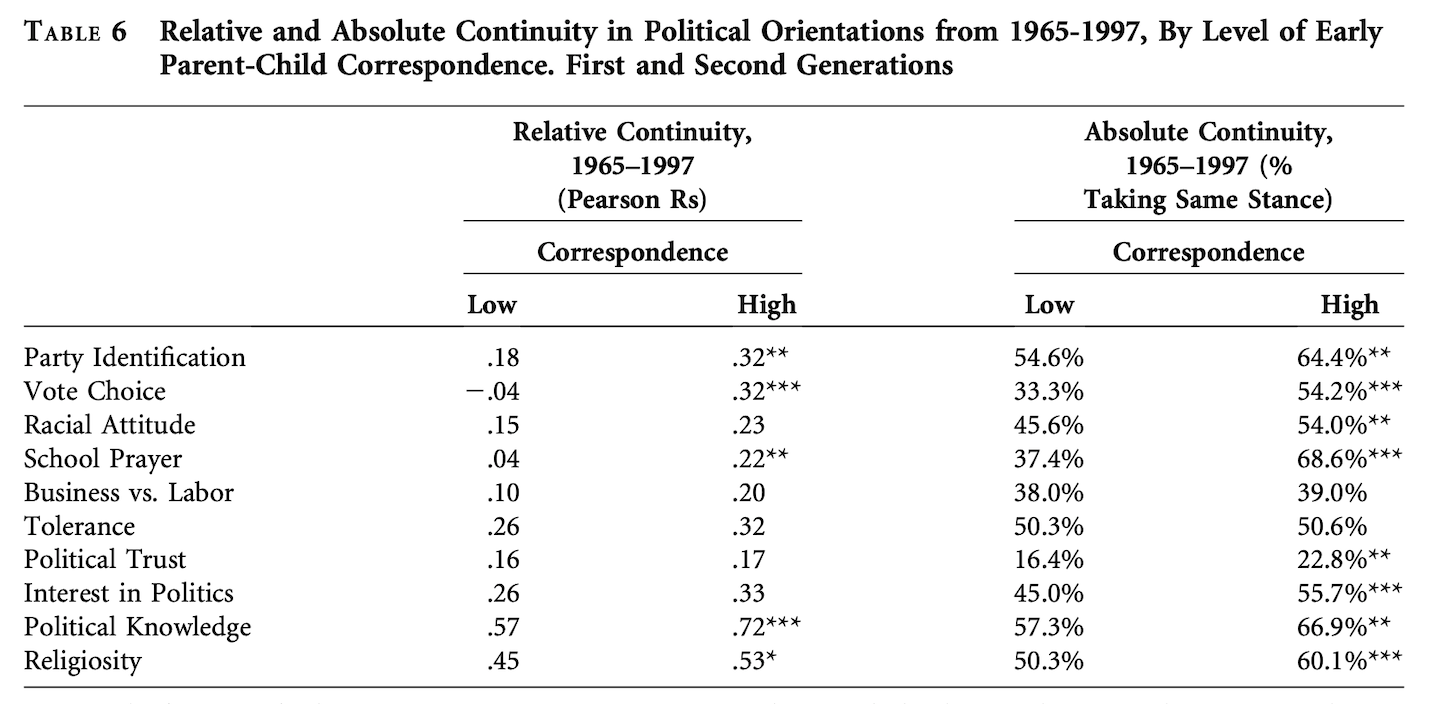
Does family socialization always lead to transmission?

Elias (2012)

Elias (2012)
The reason politicized parents are more likely to end up with adult children who have divergent partisan preferences is that, by facilitating political discussions at home, they make the offspring more attentive to the political messages of their times (p 848)
Schools as an agent of socialization
Schools as an agent of socialization
- How would we know that it is schools and not factors associated with attending different schools that explained variation in political attitudes and behavior?
Schools as an agent of socialization
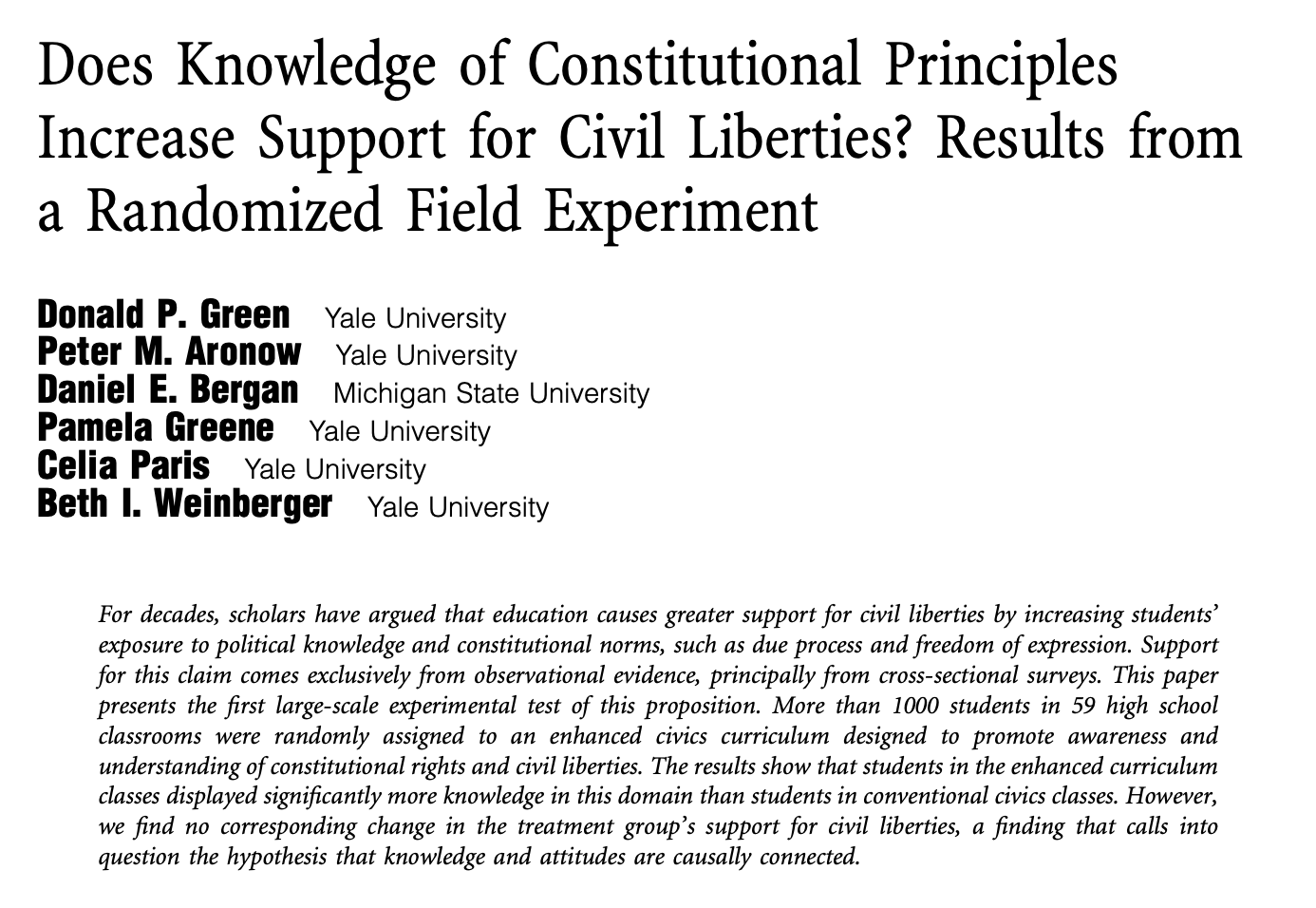
Schools as an agent of socialization
Green et al. (2011) randomly assign some students within schools to receive and enhanced civics education
Does civics education:
increase knowledge?
does that knowledge increase support for civil liberties
The Bill of Rights in Real Life

Design

Treatment increases knowledge of civil liberties

But has no effect on support for civil liberties

The state as an agent of socialization
Policy Feedback
Citizens shape politics and policies
Politics and policies can also shape citizens
Mettler (2002)

Resources and Interpretations

GI Bill increases engagement

GI Bill increases participation

Policy Feedback and the Carceral State
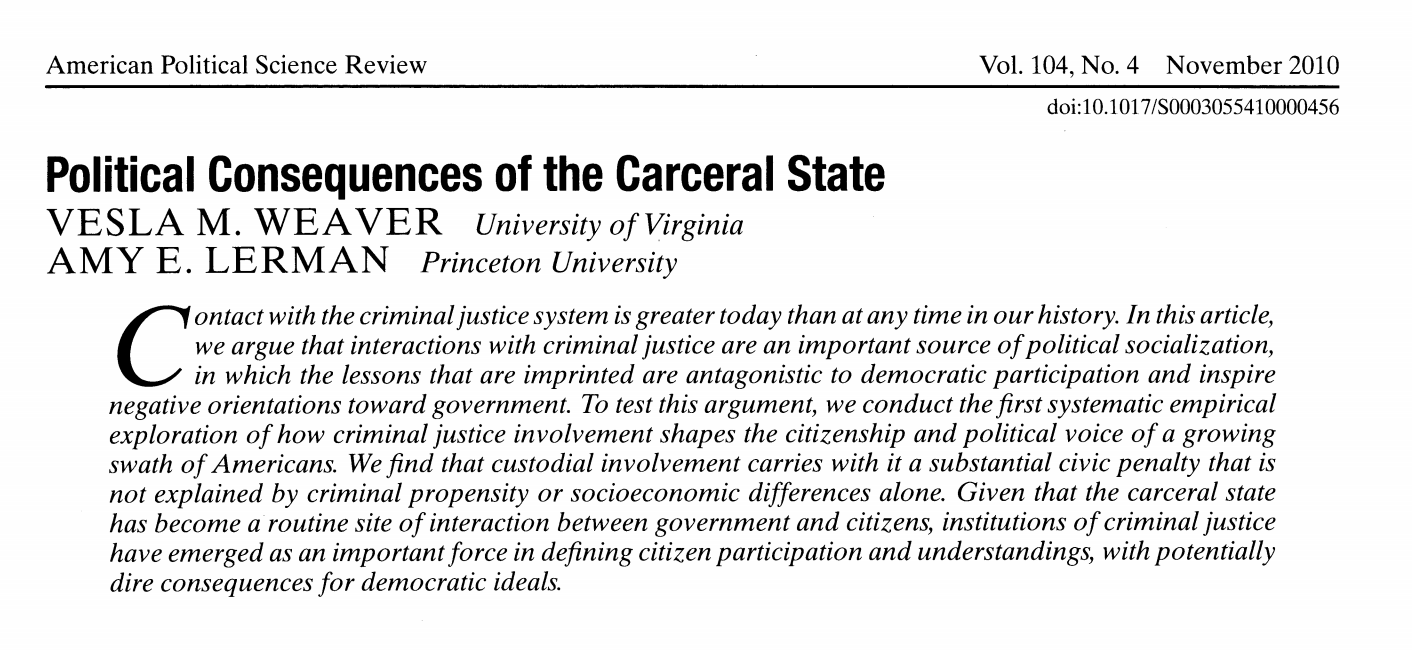
Policy Feedback and the Carceral State

Nature vs Nurture
Nature vs Nurture
Socialization focuses on environmental determinants of political attitudes and behavior (Nurture)
A growing body of research suggests many political differences have a dispositional component rooted in biological differences (Nature)
Biology and Politics
Different approaches for studying biology and politics
Twin studies
Candidate Gene studies
Physiological studies
Big 5 Personality traits
Alford, Funk, and Hibbing (2005)

Twin Studies

ACE Models
A = Additive genetic variance (Nature)
C = Shared environmental variance (Nurture)
E = Non-shared environmental variance (and measurement error)
ACE Models

Heritability of Political Attitudes

Heritability of Political Attitudes

Biology and Politics
Candidate Gene studies
Twin studies establish heritability but don’t address mechanism
Candidate gene studies attempt to go further looking at variation in specific genes (alleles) known to be associated with specific biological outcomes
Candidate Gene studies

Serotonin, pro-social behavior and the MAOA and 5HTT genes

Two genes predict turnout!

Or do they (Charney and English 2012)

Physiological studies
Candidate gene studies are challenging and problematic
Variation in physiological responses is highly heritable (more biologically determined) and more easily observable
Map this variation onto political differences suggest they too have a heritable component
Oxley et al. (2008)

Oxley et al. (2008)

Personality Traits
Hard to study physiological responses “in the wild”
Personality traits are also heritable and more easily measured
The “Big-Five”
- Openness to new experience
- Conscientiousness
- Extroversion
- Agreeableness
- Neuroticism (Emotional stability)
TIPI

Personality and Politics

Personality and Politics

Direct Effects

Contingent Effects

Summary
- Both nature and nurture matter
- Neither environmental nor biological determinism
- Studying biology and politics
- Twin studies → heritability (of differences)
- Gene and Physiological studies → mechanisms
- Personality traits → broader implications
Group Discussion
- What are the implications of debates about nature vs nurture for politics?
- Is the divide and either/or or a continuum?
- Does it matter how much of each?
Summary
Political socialization seeks to explain “what, how, and when political attitudes and behavior are learned”
Micro (process) vs Macro (outcomes)
Studying socialization is hard
Mechanisms often inferred rather than observed
Need good theory and design
Different agents of socialization
Variation in attitudes and behavior a product of both nature and nurture
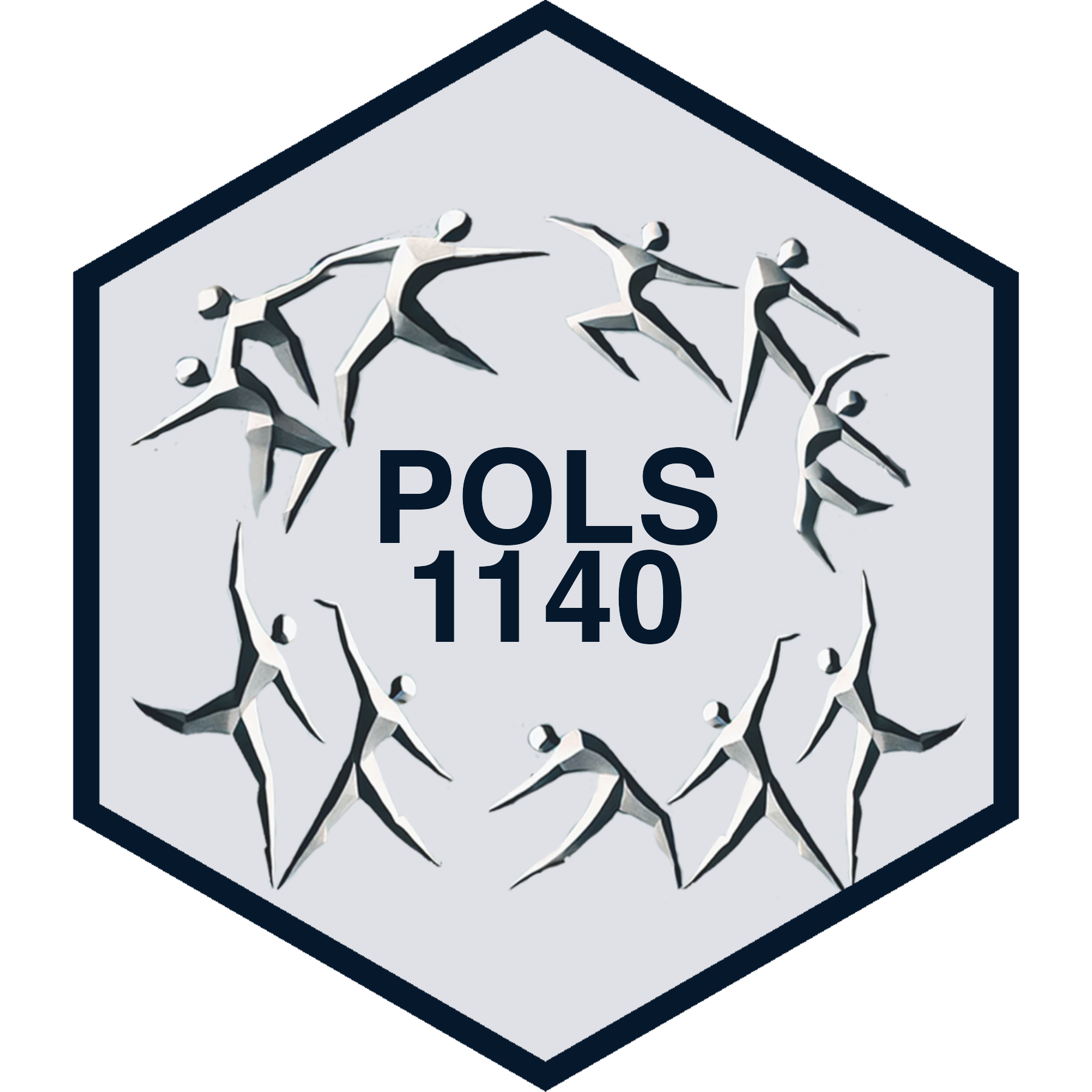
POLS 1140
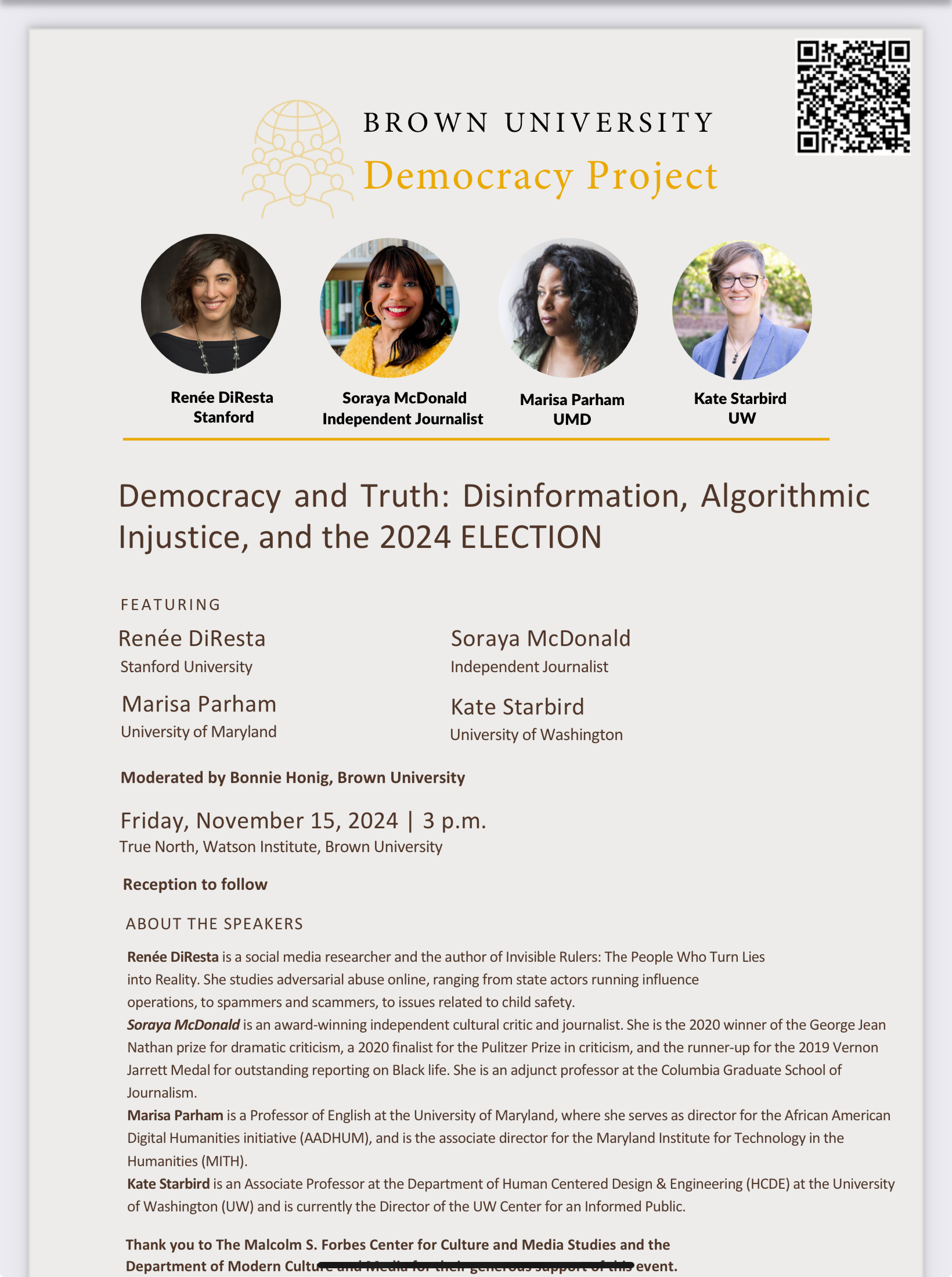
Social Learning